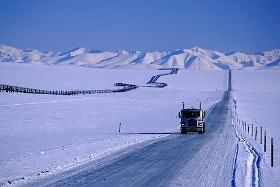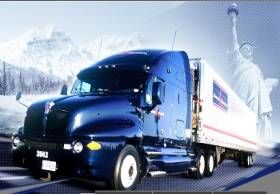Canada
Topic 6227 | Page 1
Ron, we have a few drivers in here who cross the border occasionally. Some of the problems associated with that are the differences in the H.O.S. rules, different load securement rules (for flat-beds), and time delays at the actual border point - I've heard tales of long delays when trying to return back into the U.S. This usually depends entirely on the particular crossing that you are at, but some of them seem to have the reputation of being more than willing to let you into Canada, and then requiring you to jump through hoops with all kinds of extra information or paper work to come back home.
EPU:
Electric Auxiliary Power Units
Electric APUs have started gaining acceptance. These electric APUs use battery packs instead of the diesel engine on traditional APUs as a source of power. The APU's battery pack is charged when the truck is in motion. When the truck is idle, the stored energy in the battery pack is then used to power an air conditioner, heater, and other devices

Some things to be aware of if you travel to Canada:
1/ Trucks traveling in both provinces must be speed limited to105 km/h.
2/ If you've taken a reset to start your most recent duty cycle it must be 36 hours, not 34 hours.
3/ Signage is Metric, so you best know the height of your vehicle in metres.
4/ Ditto for speed signs, they'll be in km/h.
There are more things to contend with, but those are the first that came to my mind.
HOS:
Hours Of Service
HOS refers to the logbook hours of service regulations.
Ron, we have a few drivers in here who cross the border occasionally. Some of the problems associated with that are the differences in the H.O.S. rules, different load securement rules (for flat-beds), and time delays at the actual border point - I've heard tales of long delays when trying to return back into the U.S. This usually depends entirely on the particular crossing that you are at, but some of them seem to have the reputation of being more than willing to let you into Canada, and then requiring you to jump through hoops with all kinds of extra information or paper work to come back home.
And again old school..thank you,just thought it would be good for the miles,I never looked at it that way
EPU:
Electric Auxiliary Power Units
Electric APUs have started gaining acceptance. These electric APUs use battery packs instead of the diesel engine on traditional APUs as a source of power. The APU's battery pack is charged when the truck is in motion. When the truck is idle, the stored energy in the battery pack is then used to power an air conditioner, heater, and other devices

Some things to be aware of if you travel to Canada:
1/ Trucks traveling in both provinces must be speed limited to105 km/h.
2/ If you've taken a reset to start your most recent duty cycle it must be 36 hours, not 34 hours.
3/ Signage is Metric, so you best know the height of your vehicle in metres.
4/ Ditto for speed signs, they'll be in km/h.
There are more things to contend with, but those are the first that came to my mind.
thanks alot Mike,all of that didnt even cross my mind,
HOS:
Hours Of Service
HOS refers to the logbook hours of service regulations.And of course the killer of it is you usually don't make any more money going to Canada than you would to Ohio or Texas. It's just an extra pile of variables and uncertainties to deal with with little or no reward. Some companies may pay a little bonus for going there, but most won't, and it wouldn't be worth it anyhow.
New Reply:
New! Check out our help videos for a better understanding of our forum features

















Preview:








 TT On Facebook
TT On Facebook
why do so many drivers frown about taking loads to canada?